|
Congratulations to Associate Professors Dennis vanEngelsdorp & Daniel Gruner for making the Clarivate Analytics’ 2018 list of Highly Cited Researchers, a compilation of influential names in science. vanEngelsdorp's research focuses on using an epidemiological approach to understand and improve pollinator health, which involves understanding the etiology of individual diseases and large-scale monitoring. Gruner's research investigates species interactions in food webs, the maintenance of biodiversity in ecological communities, community feedbacks with ecosystem function, and the impacts of global change. Read more>>
 Congratulations to Peter Coffey (Hooks Lab), UMD ENTM Grad Program's newest MS graduate, for successfully defending his thesis, "Can cover crop residues suppress pests and improve yield in eggplant?"  Dr. Kimberly Wallin Dr. Kimberly Wallin Written by: Jonathan Wang & Mike Nan It’s no secret that the road to academia is tough. Faced with a “publish or perish” atmosphere and stagnant or declining rates of scientific funding, the academic route for a graduate student is daunting. A recent study suggests graduate students are six times more likely to experience depression and anxiety compared to the general population. Part of the problem is how hard it is to navigate a way into a tenure-track position. Thankfully, the problem is being recognized and a number of high-profile failure CVs have made waves online. Dr. Kimberly Wallin has her own advice to graduate students and reveals exactly “how the heck” she got here. 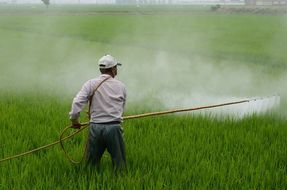 Phoo Credit: SESYNC Phoo Credit: SESYNC Professor David Hawthorne has a paper out in Nature Sustainability titled, “Antibiotic and pesticide susceptibility and the Anthropocene operating space.” This first assessment of planetary boundaries for antibiotic and pesticide resistance shows several boundaries have already been crossed. “Based on current trends in antibiotic, insecticide and herbicide resistance, we conclude that the states of all six assessed variables are beyond safe zones, with three variables surpassed regionally or globally.” Find full press release on SESYNC’s news page. What does it take to restore the once abundant underwater grasses of the Chesapeake Bay?11/19/2018
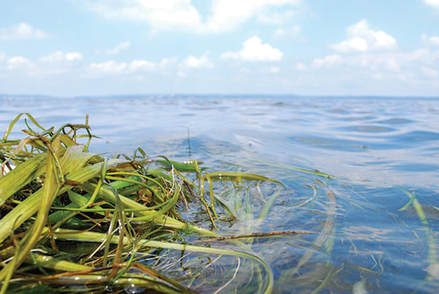 Wild celery and water stargrass are thriving in the Susquehanna Flats. Photograph, Chesapeake Bay Program Wild celery and water stargrass are thriving in the Susquehanna Flats. Photograph, Chesapeake Bay Program Professor Maile Neel's research into the genetic diversity within species of submerged aquatic grasses points to new approaches for Bay restoration managers. Quote: “She (Neel) has convinced us that we need to keep our seeds in the same region that they were harvested from,” Landry said. “Her argument is that it’s best to keep the plants local. It might be a waste of seeds and time if we move them too far — they might not be genetically suitable for the conditions in that spot. Plus, since they’ve found so much genetic diversity in the wild celery populations in the Bay, there’s no need to move the plants outside their region to increase diversity.” Read more about how Neel's research is contributing to Bay restoration in this issue of Maryland Sea Grant's Chesapeake Quarterly. 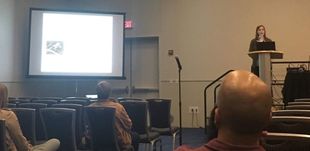 Congratulations Morgan Thompson (ENTM MS student, Lamp Lab) for winning first place in the Student 10-minute Paper Competition at the ESA Joint Annual Meeting in Vancouver. Morgan’s award-winning talk: "Can aboveground potato leafhopper (Empoasca fabae) feeding disrupt belowground nitrogen fixation in alfalfa?" 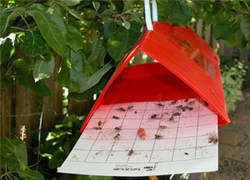 Pheromone trap for codling moth detection in apple orchards Pheromone trap for codling moth detection in apple orchards Written by: Veronica Yurchak & Anthony Nearman Managing a crop pest means more than simply spraying fields with insecticides. What and when to spray, how much, and where to apply chemicals are all questions that any successful pest control must address. To further complicate things, the answers to those questions will change with any given pest. How then do we confront the vast number of pests plaguing our agricultural systems? Dr. Jim Miller believes he has an answer, and it begins with sex. 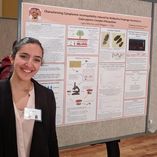 Lyra Morina, CBMG undergrad in Fritz Lab, is among the winners of the Bioscience Day Poster Competition. Her winning poster, “Characterizing Cytoplasmic Incompatibility induced by Wolbachia Prophage Insertions in Culex pipiens Complex Mosquitoes” was presented in the Molecular, Cellular and Developmental Biology category. Congratulations Lyra! 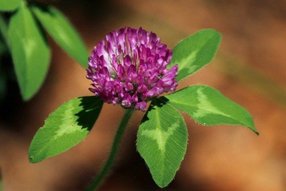 UMD researchers Hanna Kahl, Alan Leslie and Professor Cerruti Hooks assess the effects of cover crops on arthropod communities. Read their findings in their recent paper, "Effects of Red Clover Living Mulch on Arthropod Herbivores and Natural Enemies, and Cucumber Yield", published in Annals of the Entomological Society of America. 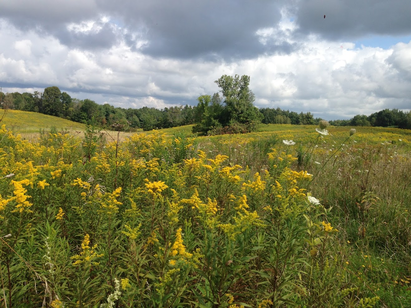 A old field of goldenrod, asters and Queens Anne’s Lace in Winooski, VT. A old field of goldenrod, asters and Queens Anne’s Lace in Winooski, VT. Written by: Zac Lamas and Graham Stewart If you are traveling in New England and have ever passed an open meadow that isn’t being used for agriculture, you’re probably looking at an “old field” ecosystem. These are dense fields filled with a variety of flora- typically dominated by the early summer legumes trefoil and trillium, followed by the late season goldenrods and asters. While these fields are often overgrown, occasional mowing or controlled burning prevents succession to a forested state. These old field ecosystems provide rich models for studying nutrient cycling. Rob Buchkowski, a PhD candidate from Yale, has spent his dissertation investigating “brown” (traditionally thought of as belowground) and “green” (traditionally thought of as aboveground) food webs, and how nutrition flows through and between these components of old field ecosystems. If you’re up for a bit of a ride, we’ll follow Rob through a bird’s eye view of the major principles of food chains, how nutrition moves through the system, and how we can mathematically model these systems 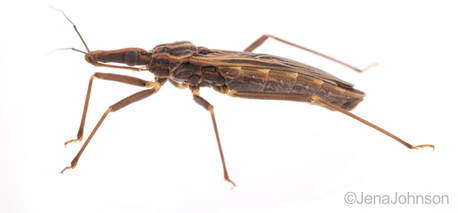 The kissing bug, Rhodnius prolixus. © Jena Johnson The kissing bug, Rhodnius prolixus. © Jena Johnson Written by: Arielle Arsenault-Benoit & Katie Reding Vector development and reproduction are imperative to combating vector-borne illness. Dr. Kevin Vogel and his research team at the University of Georgia are employing an integrative approach to further understanding of these factors in mosquitoes and a triatomine kissing bug. 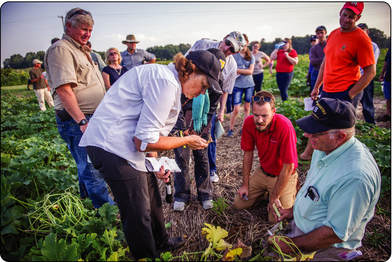 Kate Everts (Plant Pathology Specialist, UMD Extension) inspects a diseased pumpkin root at an evening farm meeting with agents and producers. Photo by: E Remsberg Kate Everts (Plant Pathology Specialist, UMD Extension) inspects a diseased pumpkin root at an evening farm meeting with agents and producers. Photo by: E Remsberg Peter Coffey , University of Maryland Cooperative Extension Agricultural Science Agent, ENTM Graduate Student (Hooks Lab), has a paper out in Frontiers in Ecology and the Environment. Check out full article, "Careers in Cooperative Extension" at https://esajournals.onlinelibrary.wiley.com/doi/full/10.1002/fee.1971 |
Categories
All
Archives
June 2024
|
Department of Entomology
University of Maryland
4112 Plant Sciences Building
College Park, MD 20742-4454
USA
Telephone: 301.405.3911
Fax: 301.314.9290
University of Maryland
4112 Plant Sciences Building
College Park, MD 20742-4454
USA
Telephone: 301.405.3911
Fax: 301.314.9290

 RSS Feed
RSS Feed




